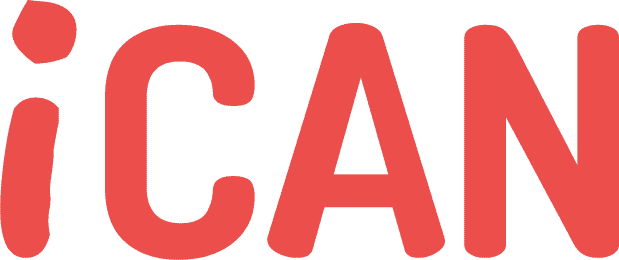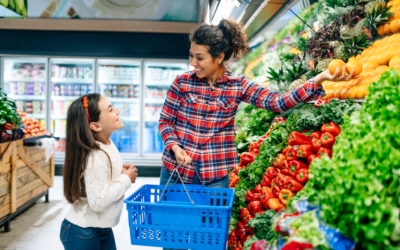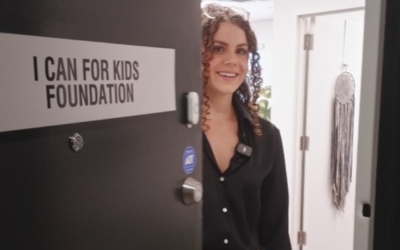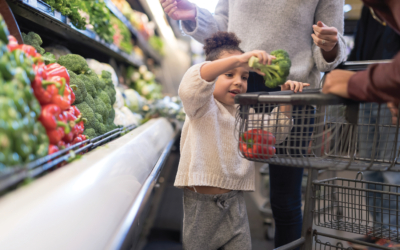Our partners identify vulnerable kids and families most in need and offer our gift cards to help ease the stresses caused by lack of household income and food insecurity. The U of C study confirms our approach is working.
Over the past few months, we’ve been sharing the preliminary findings from our University of Calgary (U of C) research study funded by the O’Brien Institute for Public Health, Nutrien and I Can for Kids donors. This new study, the first of its kind in Canada, is not only helping us understand how grocery gift cards help alleviate food insecurity, but also underscoring the incredible ripple effect this type of approach is having on families.
In July, we shared how I Can for Kids grocery gift cards relieved stress over household finances and household food supply. Next, we highlighted how our gift cards were effective in enhancing dignity and autonomy and gave caregivers the opportunity to shop for their own groceries and purchase foods that met their children’s unique needs. And last month we focused on improvements in diet quality and how recipients of our grocery gift cards were able to purchase more fresh fruit and vegetables and reduced their intake of canned fruit and vegetables, frozen meals, and sugary snacks.
This is great stuff. But there’s more good news!
I Can for Kids counts on over 25 frontline social service agency and community partners to help distribute our grocery gift cards throughout the city. Our partners identify vulnerable kids and families most in need and offer our gift cards to help ease the stresses caused by lack of household income and food insecurity. The U of C study confirms our approach is working.
The preliminary findings revealed our distribution model enhanced trust and rapport between our frontline agency partners and recipients. Our gift cards were an effective conversation starter to connect with new clients and reconnect with existing clients lost to follow-up. And when our partners offered our gift cards, they told researchers it increased recipients’ willingness to seek support in other areas of need such as financial literacy, job-seeking skills, and mental health support. And from the recipients’ perspective, they described how interaction with our partners helped them feel cared for and less isolated. It’s these connections that helped form peer support groups and inspired recipients to take on leadership roles in community.
“…one of the really positive sides of [GGC] is that it’s connected me with families in the community that I wasn’t connected with necessarily before…some families are taking on leadership roles within the community. I also had a lot of conversations…with families that have been getting gift cards…So from there, we’ve now developed a parenting group in the community.”
– Sandra, agency partner
“I felt that I’m a part of my community…one day I called [the agency] and said ‘is there anything in terms of food?’ And then [agency staff] said ‘yes, we have [GGC], can you come?’ And really, I was not expecting anything. I felt so excited…so positive…and I felt that there is somebody to take care [of us], and there is help around us, and we are not alone.”
– Jameela, two-parennt household, 3 children
We’re in tough times and thousands more families need access to resources beyond just food. I Can for Kids works with frontline agency partners because they are a critical conduit for helping families stabilize their housing, getting them mental health support, helping them find work, and building financial literacy and parenting skills.
The ease of receiving and distributing grocery gift cards contributes to their ability to focus and connect in a way that helps recipients feel heard, respected, and supported.
By providing grocery gift cards instead of food, we’re disrupting 40 years of traditional food hamper programming. We know. We were one of them. But when grocery gift cards contribute to the overall wellbeing of kids and families – reducing stress, improving diet quality, and building confidence and community through a more dignified approach that’s not achieved with food hampers – the impact is too hard to ignore.
As we approach the holiday season, the need is growing and so is our waiting list.
Working together with our diverse network of frontline partners means we’re reaching hungry kids in all sorts of situations. But no matter their situation, the result is the same – kids are suffering.
We’re asking you to please give your most generous donation and help us continue to tackle childhood hunger in our city. Thank you!
It’s time to tackle childhood hunger.
We’re on it, but we need your help – our fundraising goal for 2021 is $1.4 million. Please donate today!
Learn more about who we are and how we’re impacting the lives of hungry children in Calgary,
visit www.icanforkids.ca/our-work/.




